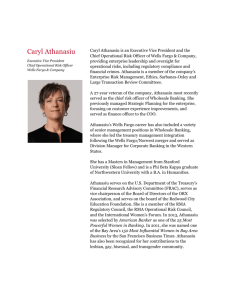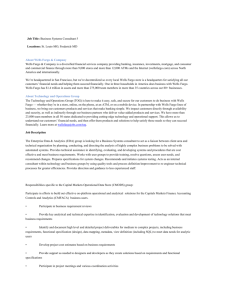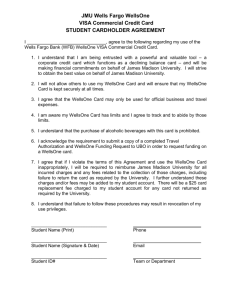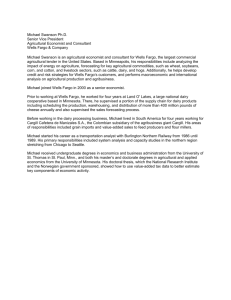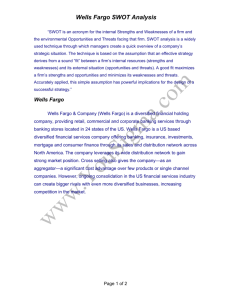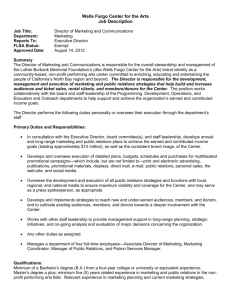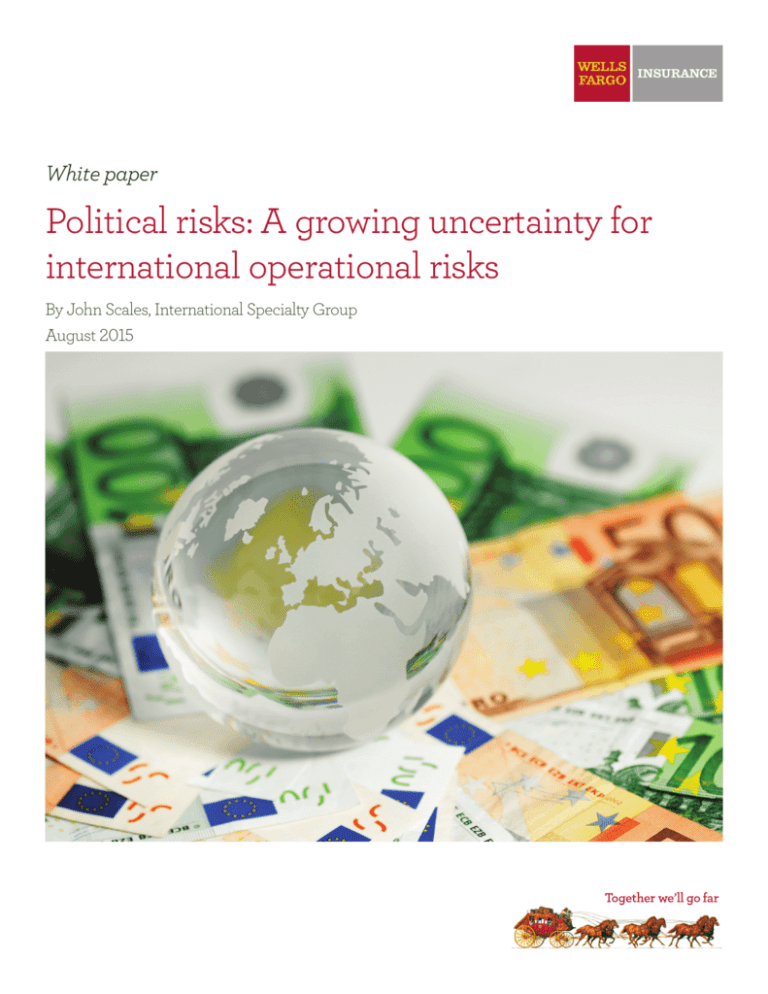
White paper
Political risks: A growing uncertainty for
international operational risks
By John Scales, International Specialty Group
August 2015
According to Wells Fargo’s 2015 International Business
Indicator, 80% of respondents agree that for longterm revenue growth, U.S. companies should consider
expanding internationally.1 When considering new
markets to enter, the survey shows U.S. businesses focus
most on political stability, with 89% saying political
stability is somewhat or very important.
In light of continued interest in international expansion,
managing political risk is an area of increasing importance
to multinational businesses as they face a steadily
increasing breadth and severity of operational risk. From
a geopolitical and governance standpoint, the world is
an ever-changing place. One need not look further than
the country of Cuba to see how the climate for business
is always dynamically changing as well. While today’s
multinational companies face the same operational perils
that existed 50 years ago, the changing international
landscape requires managing these risks in different ways.
In fact, according to the World Economic Forum Global
Risks 2015 report, the biggest threat to the stability of
the world in the next 10 years comes from the risk of
international conflict, exceeding the threat from extreme
weather events.2
What is political risk and what are the
potential impacts?
According to OPIC, the U.S. Government’s development
finance institution, political risks can include3:
• War, civil strife, coups and other acts of politicallymotivated violence, including terrorism
• Expropriation, including abrogation, repudiation and/or
impairment of contract and other improper host
government interference
• Restrictions on the conversion and transfer of localcurrency earnings
The impacts of these types of events can range from
the temporary disruption of companies’ operations and
supply chains to the nationalization of company assets
or, events that threaten the physical safety of a company’s
employees. Business can sustain damage to property, and
also incur difficulty with a host of financial transactions.
While businesses often consider underdeveloped
countries as being at highest risk for political risk, the risk
for developed nations can pose uncertainty as well. When
the Ukraine-Russia conflict arose in Crimea in 2014,
Western operations in the Ukraine were severely impacted
not only by the conflict, but also the various governmental
and U.N. sanctions that were imposed on certain parts of
the country.
According to Verisk Maplecroft’s annual 2015 Political
Risk Analysis, Russia has been flagged as “high risk”
and a grave source of political risk uncertainty in 2015,
and ranks 21st out of 198 countries in the company’s
Dynamic Political Risk Index.4 The analysis notes that in
2014, Russia’s actions in Ukraine contributed to the latter
experiencing the biggest deterioration in the Dynamic
Political Risk Index, falling from 82nd to 20th highest risk
during the year. The report states that “Resulting Western
sanctions have effectively shut major Russian corporations
out of international financial markets and barred energy
firms from further operations in Russia’s oil sector.”
How concerned are companies about
political risk?
Managing political risk is of increasing importance to
multinational businesses. Consider these recent survey
findings:
• In the Multilateral Investment Guarantee Agency’s
2013 World Investment and Political Risk report (MIGA
report), political risk took second place among possible
impediments to foreign direct investment, behind
microeconomic instability.5 Within the category of
political risk, breach of contract and regulatory risks
topped survey respondents’ concerns. “Survey results
showed that these concerns are based on actual
experience, as well as sentiment, with respondents
rating these factors as the key political risks that
resulted in actual losses over the past three years.”
• The Association for Financial Professionals and Oliver
Wyman Risk Survey 2015 showed that political risk
ranked in sixth place among 20 factors expected to
have the greatest impact on organizations’ earnings
over the next three years.6
Wells Fargo Insurance white paper: Political risks: A growing uncertainty for international operational risks | August 2015
2
• While not measured in the 2015 report, the Association
for Financial Professionals and Oliver Wyman Risk
Survey 2013 report7 cited political risk as ranking in
fourth place in terms of its difficulty to forecast, behind
natural catastrophe, regulatory risk and product liability.
The study noted that 62 percent of survey respondents
cited political risk as a risk, yet relatively few
organizations are forecasting political risk.
Specific examples of political risk impacts
Several recent examples highlight the array and impact
involved with political risks.
War and political unrest: As result of the 2014 RussiaUkraine conflict over Crimea, Western countries
implemented political sanctions against Russia, and the
supply chains for European companies that import energy,
grain, titanium, palladium, and nickel from Russia and
Ukraine have been affected. Most seriously impacted was
Germany’s automobile manufacturing industry, which is
one reason that Germany opposed imposing many of the
sanctions. U.S.-based multinational companies could also
feel pressure to withdraw from the Russian marketplace
not as a result of the deteriorating economy, but also
because of the sanctions imposed.
Currency impacts: In the Wells Fargo survey, 63% of
companies said currency and exchange rates play a major
role in their company’s international business decisions.
However, host country currency exchange restrictions
can have a disastrous impact on the commercial viability
of a project, preventing a business from converting and
transferring profits from the project and return of capital,
and ability to meet debt obligations.
Venezuela is a prime example. Since 2003, the
government has maintained strict currency controls,
operating with a multi-tier exchange rate system for the
sale of dollars to private sector firms and individuals, with
rates based on the government’s import priorities, which
has gone through various iterations. The latest iteration in
February 2015 was an effective devaluation of Venezuela’s
bolivar currency that threatened to dramatically reduce
the value of Venezuelan monetary assets held by 10 large
American companies.8
Expropriation: Expropriatory acts and other forms of
unlawful interference by the host government can deprive
companies of their fundamental rights in a business or
project. According to OPIC, government interference in a
project can take many forms, among them3:
• Abrogation, repudiation, and/or impairment of contract,
including forced renegotiation of contract terms
• Imposing of confiscatory taxes
• Confiscation of funds and/or tangible assets
• Outright nationalization of a project
The utility, mining and metal industries have increasingly
been seeing resource nationalization over the years.
Increasing royalties and taxes offers a means for
governments to get more money, and in the more rare case
of outright expropriation or nationalization of companies,
some also view it as a way to expand employment. A
country’s political and economic environment has a direct
impact on resource nationalism, meaning outcomes of
local elections often come into play and are important to
monitor.
As one example, in 2012, Argentina moved to nationalize
an energy company YPF, which was majority-owned by
a Spanish energy company, Repsol YPF.9 Similarly, in
Russia, authorities determined Yukos Oil Company to be
an attractive strategic asset and expropriated it in 2003.
The company was one of the 10 largest in Russia and had
quickly grown from a $320 million company in equivalent
U.S. dollars in 1999 to $21 billion by 2003.10
A January 2015 article in the New York Times noted that
in the current environment in Crimea, confiscations of
businesses in various industries are “being carried out
in a widespread, systematic fashion that has no recent
precedent.” It noted that in 10 months, business owners
estimate they have lost more than $1 billion in real estate
and other assets to government seizure.11
Wells Fargo Insurance white paper: Political risks: A growing uncertainty for international operational risks | August 2015
3
Political risk insurance as a complementary
tool for risk management
Given examples such as those above, along with the
general market turbulence, high-profile expropriations,
persistent resource nationalism, capital constraints, and
regulation, the MIGA report shows that the last several
years have seen a dramatic increase in political risk
insurance (PRI) issuance, noting that PRI issuance has
exceeded the pace of increase in foreign direct investment
flowing into developing economies over the same period.12
Political risk insurance helps cover losses to tangible
assets, investment value, and earnings that result from
political perils. It not only covers transactions with
private sector obligors for confiscation, expropriation,
nationalization, currency inconvertibility, and political
violence, but also transactions with public sector obligors
and state-owned enterprises for not honoring promissory
notes, sovereign guarantees, or letters of credit from a
sovereign entity.
The risk is real — a foreign government’s action, or
inaction, can result in a company’s loss of property,
income, or financial assets. However, along with good
risk management practices, political risk insurance can
help investors, financial institutions, and corporate clients
protect their investments in overseas markets against
unpredictable losses caused by specified political risk
perils.
Sources:
1. Wells Fargo 2015 International Business Indicator survey
https://www.wellsfargo.com/com/focus/international-business-indicator
2. World Economic Forum Global Risks 2015 report. Accessed July 7, 2015.
http://reports.weforum.org/global-risks-2015/press-releases/
3. OPIC (Overseas Private Investment Corporation)
https://www.opic.gov/who-we-are/overview
4. Verisk Maplecroft’s annual 2015 Political Risk Analysis
http://maplecroft.com/portfolio/new-analysis/2014/12/10/volatile-elections-instabilityand-rising-violence-leave-investors-facing-turbulent-2015-emerging-markets-veriskmaplecroft-political-risk-atlas/
5. World Investment and Political Risk 2013. Washington, DC: MIGA, World Bank Group.
DOI: 10.1596/978-1-4648-0039-9 License: Creative Commons Attribution CC BY 3.0.
Accessed July 7, 2015.
http://viewer.zmags.com/publication/1ea4e02d#/1ea4e02d/1
6. Association for Financial Professionals and Oliver Wyman Risk Survey 2015. Accessed
July 7, 2015.
http://www.oliverwyman.de/content/dam/oliver-wyman/global/en/2015/
jan/2015RiskSurveyReport-FINAL.pdf
7. Association for Financial Professionals and Oliver Wyman Risk Survey 2013 survey.
Accessed July 7, 2015.
http://www.oliverwyman.com/content/dam/oliver-wyman/global/en/files/
archive/2013/2013_AFP_Risk_Survey_-_Final.pdf
8. “Venezuela’s currency devaluation set to further hurt U.S. companies’ profits.” Accessed
July 7, 2015.
http://www.reuters.com/article/2015/02/14/
us-venezuela-economy-currency-analysis-idUSKBN0LI00W20150214
9. “Argentina to Seize Control of Oil Company.” Accessed July 7, 2015.
http://www.nytimes.com/2012/04/17/business/global/argentine-president-tonationalize-oil-company.html?_r=0
10. Yukos Oil Company and Russian Expropriation. Accessed July 13, 2015.
http://expropriationnewsrussia.com/en/prominent-russian-expropriation-cases/
yukos-oil-company/
11. “Seizing Assets in Crimea, From Shipyard to Film Studio,” Jan. 10, 2015, New York Times.
http://www.nytimes.com/2015/01/11/world/seizing-assets-in-crimea-from-shipyard-tofilm-studio.html?_r=2
12. “World Bank Sees Record Demand for Political Risk Insurance,” Dec. 5, 2013,
Bloomberg Business
http://www.bloomberg.com/news/articles/2013-12-05/
world-bank-sees-record-demand-for-political-risk-insurance
For more information, contact your Wells Fargo Insurance
sales executive or:
John Scales
404-923-3636 | john.scales@wellsfargo.com
Wells Fargo Insurance Services USA, Inc. does not provide insurance products and services outside of the United States. Insurance products and services may be provided outside of the
United States by foreign brokers licensed within their home venue.
Foreign brokers are not employed by any Wells Fargo legal entity. Foreign brokers are individual insurance brokers responsible for compliance with all regulatory requirements of their
home venue.
In the United States, products and services are offered through Wells Fargo Insurance Services USA, Inc. and Safehold Special Risk, Inc., dba Safehold Special Risk & Insurance Services,
Inc. in California, non-bank insurance agency affiliates of Wells Fargo & Company.
Products and services are underwritten by unaffiliated insurance companies except crop and flood insurance in the United States, which may be underwritten by an affiliate, Rural
Community Insurance Company. Some services require additional fees and may be offered directly through third-party providers. Banking and insurance decisions are made
independently and do not influence each other.
© 2015 Wells Fargo Insurance Services USA, Inc. All rights reserved. WCS- 1267414
Wells Fargo Insurance white paper: Political risks: A growing uncertainty for international operational risks | August 2015
4

